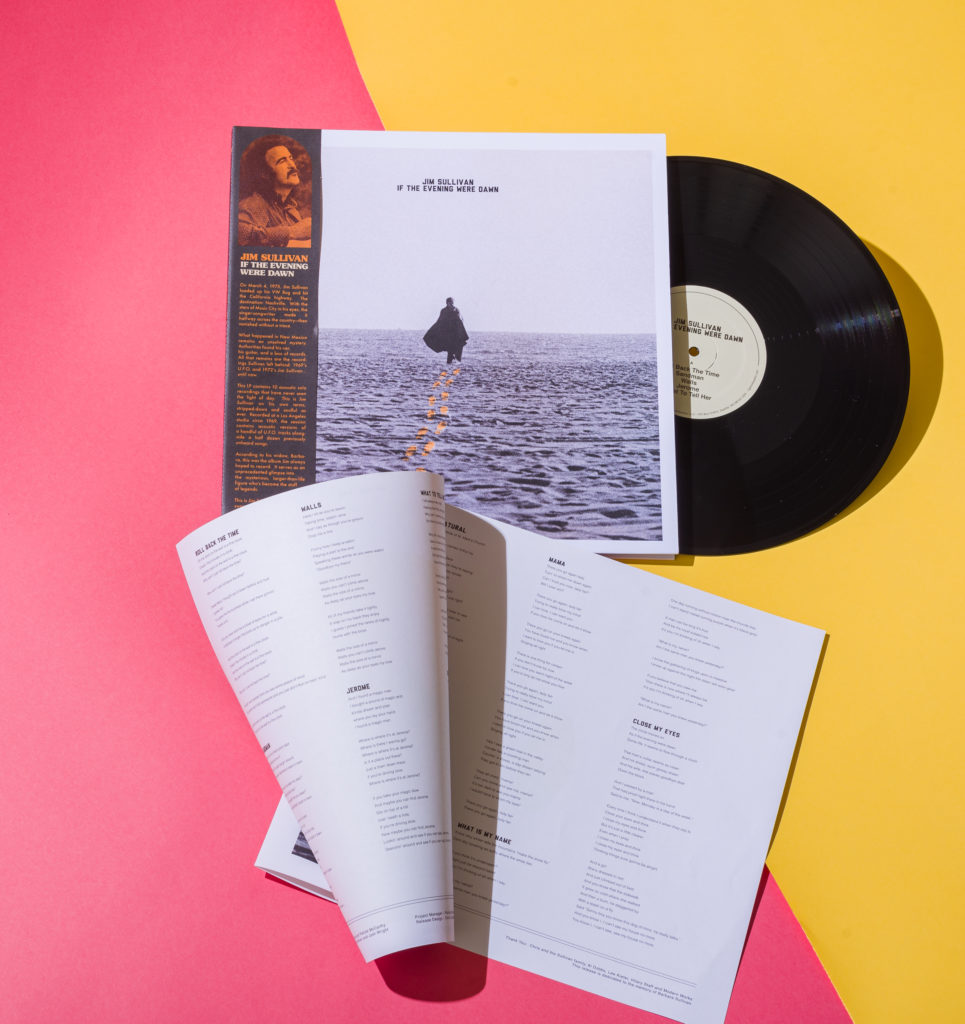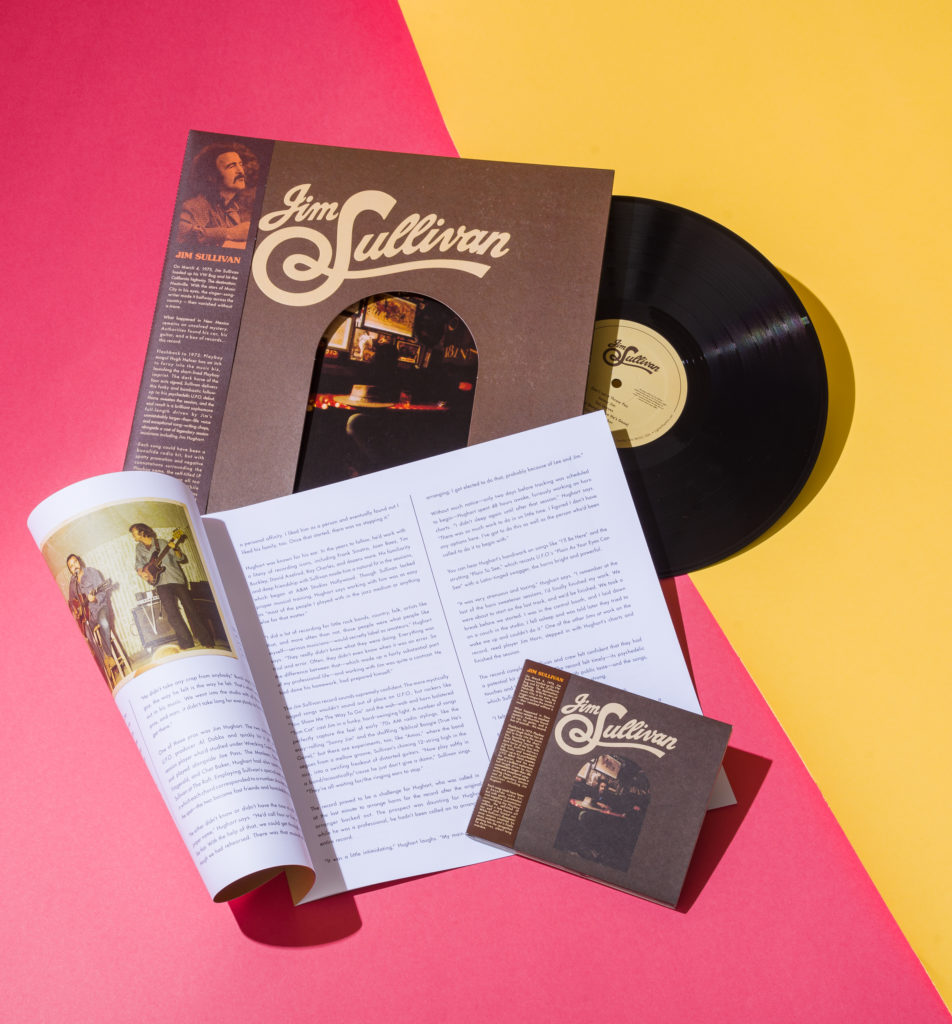Ian Preece considers Light in the Attic’s recent Jim Sullivan releases If the Evening Were Dawn and Jim Sullivan.

There was a photo in the Observer recently to accompany a feature on a hundred years of council housing. A family look happy on the balcony of their new(ish) tower block, smiling in between lines of washing drying in the sun. It’s Liverpool in the early 1970s. Down below there are bare grass verges and empty pavements – no billboards, no signage, no advertising, no road markings, no street furniture, no clutter; none of the bullshit that clogs up everywhere today. I’m probably about as old as the girl in David Newell-Smith’s shot (5 or 6) so I can just about remember this world. Some songs take you straight back there: Roxy Music, ‘If There Is Something’, Nick Drake’s ‘Time Has Told Me’, Sibylle Baier’s ‘Give Me a Smile’, The Hollies’ ‘When Your Light’s Turned On’, Bill Fay’s ‘Garden Song’ or ‘Methane River’. That’s not to say these songs aren’t knowing (and apart from The Best of the Hollies, bought from the Co-op by my nana – I didn’t know any of them till years later) – just that their spacious arrangements evoke simpler times. Jim Sullivan’s breezy ‘U.F.O.’ from 1969 is another one. Sullivan disappeared in his Volkswagen Beetle, just a crate of records, a few reel-to-reel tapes and his guitar for company, somewhere in the New Mexico desert in March 1975. Something of an LA troubadour, barfly and regular gigger in Pacific Coast Highway beach bars and motels, ‘Sully’ hung out with Harry Dean Stanton and had a walk-on part in Easy Rider; so you wouldn’t necessarily associate him with photographs of municipal housing in Harold Wilson’s Britain – but it’s there. The muted strings, economical arrangements, breezy wistfulness; an ear for a bright melody but everything imbued with a sadness, the melancholic glaze of leaves falling, quiet Sunday walks, swings and roundabouts in autumnal parks in England (or a rainy Wales, cf. Boy Azooga’s cover of ‘U.F.O.’). The Past.
That all said, the light dusting of psychedelia, orchestrated flourishes, Sullivan’s rich vocal and the easy-rolling, shuffling backbeat grooviness made U.F.O. seem like the missing the link between The Fantastic Expedition of Dillard and Clark, Lee Hazlewood’s Cowboy in Sweden and Fred Neil’s Bleecker & MacDougal or Sessions. A beautiful record, released on a tiny label into a world of Led Zeppelin II, Abbey Road and Let it Bleed – like its northern Californian cousin F. J. McMahon’s Spirit of the Golden Juice, it disappeared without trace. Light in the Attic reissued it nearly a decade ago; now comes Jim Sullivan, the more full-on sounding country/blues/funk follow-up from 1972 – alongside If the Evening Were Dawn, a new album of sketches, alternate versions and previously unheard demo-like tracks and studio recordings found on a tape in a garage in West Hollywood. For anyone who loved U.F.O., the stripped-back If the Evening Were Dawn is a must. There are paler, sometimes plaintive versions of classics from U.F.O. like ‘Roll Back Time’, ‘Jerome’, ‘Whistle Stop’ and the fantastic ‘So Natural’ – about one of Jim’s elder brothers, an insurance salesman who died of a heart attack on his way home from work – but also new songs, full of simple solo strumming, folky ache and yearning; at the beginning of ‘What Is My Name’, Sullivan sounds a bit like a proto Bill Callahan. Barbara Sullivan, Jim’s wife, said it was the album he’d always wanted to release. In fact, there’s a bit of unease in the various Sullivan sleevenotes regarding the orchestration, brass sections, and string arrangements on his two studio LPs, especially U.F.O. – to these ears, always on the alert for any overegging, that record sounds just fine, less starkly embellished than, say, Five Leaves Left – suggesting that perhaps the real Jim was the 6 foot 4, ‘slightly stooping, gently grinning poet’ who reported on the whys and wherefores of his generation from a distance; simple, unadorned observations, guitar slung over his back ready to break out into song on any street corner. Jim, it seems, was an unassuming quiet(ish) dude, happy to drink, imbibe on the peace pipe, sit around at parties or on the beach, talking about life on other planets and UFOs, looking up at the stars while listening to waves lap the shoreline in Malibu.

So god knows how Jim Sullivan went down, with its funked-up version of ‘Plain to See’ (from U.F.O.), the winsome piano flourishes of ‘Sunny Jim’, the full-on Stones stride of ‘You Show Me the Way to Go’. It’s definitely 1972 not 1969, and it’s a record that might divide Sullivan heads. I’ve played it half a dozen times now. I remain resistant to the swampy bar-room boogie of ‘Biblical Boogie’ – it sounds just too generic and would surely have rocketed Jim straight into a slot on Jools Holland; ditto the bluesy rent-a-Crescent-City-parping-horn-troupe rendition of ‘Sandman’. Not bad, by any means, and full of charm – just, you know, perhaps a bit too souped-up with nowhere to go. Tom Waits could get away with that kind of thing on The Heart of Saturday Night or Small Change because you sense both homage and some critical distance; here these session boys mean it. But this is still Jim, with that glorious voice booming through the speakers (yet beautifully understated) – just where U.F.O. was comfortably upholstered by the Wrecking Crew, Jim Sullivan is a bit more hopped-up with chrome pipes and go-faster stripes. ‘Amos’ has a trippy instrumental climax; ‘Tom Cat’ rides a terrific molten groove, all neon strip-lights, liquid guitar, funky drumming and punchy horns – Mark Lanegan in a lamé suit beneath a glitter ball. ‘I’ll Be Here’ is gorgeous, a sprightlier sibling to Townes Van Zandt’s ‘I’ll Be Here in the Morning’. Likewise, ‘Lonesome Picker’ mines that kind of descending Gene Clark harmony – we’re not talking No Other levels of orchestrated plushness here, but the sadness pulls the rug out from underneath you: ‘I often get the feeling that I’m talking to the wind / And no one hears / Believing when I’m dead and gone / Maybe some lonesome picker will find some healing in this song’.
Jim vanished into thin air. His broken-down VW was found on the land of a family with connections to the mob; there’s something shifty about the police handling of the case; Jim’s marriage was crumbling; Jim Sullivan had failed to set the world alight and transform Sully’s fortunes (despite Hugh Hefner’s Playboy Records, who originally released it, being featured heavily in Sears & Roebuck department stores) – and, even more sadly, Light in the Attic’s excellently packaged new releases are dedicated ‘to the memory of Barbara Sullivan’, who, having provided the meat of the story for the U.F.O. booklet, is perhaps finally up there now, talking lights in the sky with her long-lost beau.
*
‘If The Evening Were Dawn’ and ‘Jim Sullivan’ are out now, and available here via Light in the Attic.